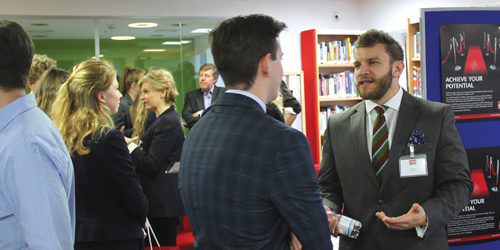
There can be few things more daunting for a young adult than going through the interview process. Hurst students are well trained for this ordeal, as many of them will have already tackled a rigorous interview - to earn a place on a two-week work experience placement.
Two weeks in a workplace may seem scant reward for all the hard work preparing for an intense interview, but for Hurst pupils the work experience process is far more important than a couple of weeks out of school.
The reason that Hurst places such emphasis on interview skills is that the careers team have a wealth of business experience - and they are used to seeing young people who are clearly not ready for the world of work.
Jan Leeper knows what to look for in a candidate as she spent eight years working in recruitment. Tania Fielden worked for GE Capital for 12 years managing the HR team. Tania says, “I have quite a lot of experience with young people in for work experience. I have seen many come in completely ill-prepared and so often they are were not engaged.”
PBM asked Tanya and Jan how the careers department can make a difference.
How do you prepare students for interviews and work experience?
Tania Fielden (TF): We have a number of work placement partners who predominantly come from our parent body and our alumni. We advertise each work placement to the Fifth and Lower Sixth Formers. They have four weeks to put a CV and letter together, which they send to me.
I spend most of the Lent term interviewing and organising first interviews. Then they get one-on-one feedback, followed up by written feedback. In many cases, they will be offered a second interview or even a panel interview, before they are put forward for an interview with the client.
It’s quite a robust process for a few days work!
TF: It is, but we don’t expect them to apply without any support. We run guidance sessions before they submit their CVs and letters. I run workshops, and they can come and see me or Jan one-on-one. They’ve got ample opportunities for help.
They’re very well supported to get it right; because I have a scoring system and they know if they submit a perfect CV and letter, they will get full marks and they’re already half way to getting that job. It’s really competitive and now the programme is fully embedded,they know when we’re going to launch and they’re ready to apply.
Are you quite a harsh interviewer?
TF: Yes. I’m from HR!
I’m not vicious, I’m not unkind, but I do expect them to be fully prepared. If they come in and meet with me and they haven’t looked into the company or they can’t tell me why they’ve applied for that job, I will send them away and say: “You’re not prepared enough. I can’t interview you if you haven’t prepared. Come back when you have.”
They can come back and have another go, because it’s a learning exercise at the end of the day.
We want to deliver a work experience programme that’s of value so that the students walk away thinking they’ve learnt something, even if it’s “Actually, I’ve learnt I don’t want to be in this industry.” That’s as useful as anything else.
Jan Leeper (JL): Preparing the students is also important to protect the clients. If we send a client five students, who then do nothing but lurk in corners being grumpy, that’s no good for the company. Companies put in their time but they’ve still got to work. If we don’t feel we have a student candidate who’s right for the role, we won’t fill the role.
Aren’t most of your students planning to go to university?
JL: Work experience is also valuable in applying for university. There’s a sense now that university applicants are expected to have work experience. Some of our students are not necessarily ready for university. Some take gap years because they’re still not ready to make those hardcore decisions, and some are looking at apprenticeships, so we support them in all those avenues.
Aside from interviews, what else do you offer in careers advice
JL: We hold a series of careers events. We will invite in representatives from different industries or specialities so the students can get a real feel for the possible career directions they can take. We will have a room with six representatives from an industry. Students can hear from each one of the individuals, so they get a whole spectrum of information about that industry. Any student from Year 9 upwards can attend these.
How much of your role is developing soft skills?
TF: It is about helping them to understand what is out there, what types of jobs and professions are out there and what might be available to them. But equally it’s about building their confidence and to understand what skills they currently have because quite often we hear “I can’t apply for that job because I haven’t got any experience, or, I haven’t got any skills.” We have to show them where they have those skills and how they can develop them.
We help them to identify what their strengths are and what they enjoy, and we work from there. And if they can identify those strengths and develop the skills in those areas, and build that confidence and knowledge of how to find those opportunities, then it’s up to them.
JL: When you look back to my father’s generation, he started in insurance and he retired from insurance and that was his career path – a job for life and you got a gold watch at the end. But that has changed. Now anybody can create a company from their living room and there’s an expectation that you will have multiple jobs in your career. So I think understanding your skill set has actually become more important.
This generation of students have a far greater awareness of what’s going on in the world politically, economically and everything else. And they are coming to us and they have anxieties – how are we going to find a job that will pay enough so that we can actually buy a house? I wasn’t that stressed when I was their age! They have an awareness that life is tough and a lot of them come in and say “I want a job that is going to guarantee me an income so that I can raise my family” and I’m thinking, “You’re 17! You have no children.” It’s trying to get them to perhaps focus on the smaller steps, understanding what they’re good at, understanding how you can apply those skills to one job but equally apply them to a totally different job so you could start in one industry and transfer to another. It’s giving them the confidence to know how good they are.
TF: When we ask them to complete feedback forms at the end of their work experience, one of the questions is “What has been the most challenging part of this process or your placement?” And nine times out of ten it’s using the telephone. They’re on their phones all the time but they’re not speaking on them. That comes back every time! Having to speak to customers on the telephone.
JL: The lessons they learn through applying for work experience and actually doing it, are invaluable. Our objective is that every student, whether through us or themselves, should leave Hurst with a work experience of some kind.
www.hppc.co.uk






